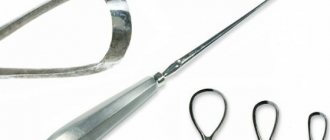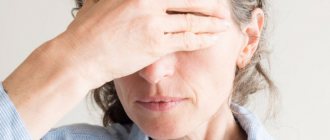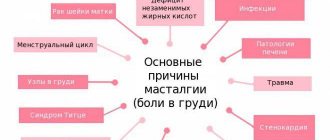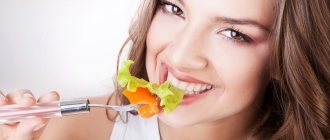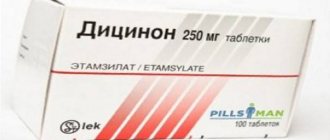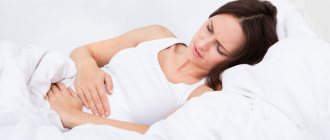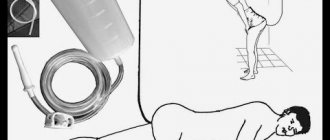Constant headaches during menopause require urgent relief. Treatment is carried out taking into account the degree of pain syndrome.
At the same time, the degree of disturbance of blood vessel tone and the presence of other signs are taken into account.
If the headaches are long-lasting and persistent, the woman is advised to undergo complex treatment. Particular attention is paid to correcting the general condition.
Medical indications
Gynecologists identify several reasons why headaches occur during menopause. The etiology of the process depends on the stage of menopause. Doctors distinguish between early and late manifestations of this period.
The physiological process in question significantly disrupts a woman’s usual lifestyle.
Headaches during menopause often occur due to disturbed hormonal balance, which ensures the functioning of the genital organs and the normal course of metabolic processes.
Problems with hormonal levels are the reason why the nervous system in women during menopause is labile. Nervous regulation can change in any direction, which provokes headaches and other symptoms.
Menopause consists of several periods, each of which is characterized by sequential changes in various processes in the female body. If there are no disturbances, the nervous system functions normally.
In women, a pronounced disturbance of homeostasis during menopause provokes headaches. The headache can be severe, accompanied by another clinic.
This condition requires urgent diagnosis and adequate treatment.
The premenopausal period is characterized by a central hormonal disorder. Sensitivity to the effects of estrogen gradually decreases.
Its constant functioning according to the principle of “reverse regulation” may be disrupted.
Against the background of such processes, there is no sufficient concentration of estrogen, which is necessary to regulate the tone of blood vessels. This leads to their spasm, which in turn leads to an increase in blood pressure. Then women get headaches.
Therefore, gynecologists believe that the primary cause of pain in the head during menopause is an imbalance between hormones.
The risk group for frequent headaches includes women who constantly suffer from VSD and surges in blood pressure.
At the same time, the processes of excitation and inhibition in the brain are disrupted. In women, nervous excitability increases, catecholamines are released, promoting spasm of blood vessels.
That is why headaches during menopause are often constant and severe. What to do to eliminate the symptoms of the period under review?
To relieve the clinical picture, symptomatic treatment and hormone replacement therapy are indicated.
Symptoms
If we talk about how a headache occurs during menopause, then in this case it will have the following features:
- occurs unexpectedly;
- discomfort begins in the temple area, and over time spreads to the forehead;
- combined with irritability and aggressiveness (these emotions are usually clearly visible on the patient’s face);
- the muscles of the face and neck are overly tense.
In some patients, these symptoms are accompanied by increased anxiety. They develop unreasonable fear and a bad feeling. In this case, dryness in the mouth and throat may occur. Swallowing becomes difficult, despite the fact that there is no reason for this.
In especially severe cases, women may complain of darkening of the eyes, a feeling of tightness and heaviness in the back of the head.
Clinical picture
The headache that is characteristic of menopause differs from a similar syndrome manifested in other pathologies. This is explained by the constant influence of etiology in the absence of therapy.
Women especially suffer from headaches, which is explained by prolonged vasospasm and concomitant hypertension. The headache appears from the moment a woman wakes up, manifesting itself throughout the day.
The syndrome in question is debilitating and does not respond to painkillers. Sometimes the pain is relieved with sedatives.
If women develop other symptoms, comprehensive treatment is indicated. Hypertension can only make headaches worse.
Therefore, patients prone to this disease are prescribed tablets of the appropriate pharmacological groups.
Other associated symptoms of the syndrome in question:
- nausea;
- lack of appetite;
- vomit;
- dizziness;
- weakness.
The first symptoms indicating a serious condition that requires treatment are the appearance of pain that cannot be treated with pain relief. Often the symptom appears gradually.
If menopause is accompanied by hot flashes, irritability increases and heart function is disrupted. Arrhythmia may develop.
If in women a headache provokes breath holding, oxygen starvation, urgent medical attention is required.
Associated clinical manifestations
During menopause, headaches are often accompanied by a variety of unpleasant symptoms. Often, attacks of cephalalgia are accompanied by hot flashes.
More than 75% of women experience such phenomena. Their frequency and intensity varies from single episodes to multiple repetitions in a short period of time, from mild discomfort to debilitating sensations.
Often attacks of cephalalgia are caused by hypertension, which is characterized by a persistent increase in blood pressure. During menopause, a woman's autonomic system reacts violently to stressful events, rewarding her with symptomatic hypertension - a sharp rise in blood pressure.
During menopause, due to a disruption in hormonal status, abrupt changes in a woman’s emotional state are often observed: causeless changes in mood, predominance of feelings characteristic of depression, irrational anxiety.
A person may be characterized by nervousness and fussiness, irritability, absent-mindedness, and forgetfulness. Common autonomic symptoms include:
- changes in heart rhythm, increased heart rate;
- excessive sweating;
- dizziness;
- instability of the vestibular apparatus when walking;
- feeling of lack of air, rapid breathing, shortness of breath.
During headache attacks, a woman may experience muscle weakness, a feeling of weakness, fatigue, and decreased performance.
Quite often, in the phase of decline of reproductive function, women experience persistent sleep disturbances: difficulty falling asleep, early morning rise, frequent awakenings at night, a feeling of dissatisfaction with night rest.
Diagnosis of the syndrome
If menopause is accompanied by prolonged pain that is self-limited, professional treatment is carried out after a thorough examination of women.
What to do at the first stage of diagnosis is decided by the doctor individually in each case.
Most often, the initial diagnosis consists of a thorough history taking. Previously, the gynecologist collects information about the nature of the flow of menstruation from the delay.
The doctor can clarify the degree of pain and its connection with stress. Since metabolism changes during menopause, laboratory testing is carried out.
For general tests, the patient donates blood and urine. The gynecologist may prescribe specific tests, including determining the concentration of the main sex hormones.
Of the instrumental methods for diagnosing pain, electrocardiography is indicated. It will exclude or confirm the presence of cardiac pathology.
During menopause, they must undergo echoencephalography to determine the degree of blood supply to the hemispheres of the brain.
Headache during menopause, which is permanent, requires differential diagnosis. The patient is prescribed an X-ray of the cervical spine and 24-hour blood pressure monitoring.
Why does my head hurt during menopause?
The main provocateur of cephalalgia during menopause is a slowdown in the synthesis of female sex hormones. Their volume in the blood drops sharply, which affects the functioning of all body systems.
There is a frequent change in the width of the lumen of the brain vessels, oxygen starvation of the tissues inside the skull occurs. This is accompanied by muscle spasms, tension or irritation of the nerve roots. An additional factor is excessive emotional excitability, causing nervous exhaustion.
External causes of headaches during menopause:
- anatomical features - deficiency or excess body weight;
- weak immunity as a result of passivity, medication abuse, bad habits, refusal of physical activity;
- a history of chronic diseases, psychoemotional disorders;
- non-compliance with basic rules for creating a daily routine and routine;
- low quality food, replacement of natural products with semi-finished products;
- weather dependence;
- being in a state of chronic stress or physical exhaustion.
You can learn more about weather dependence and symptoms of cephalalgia associated with the syndrome here.
Maintaining a healthy lifestyle, timely preparation of the body for menopause, and refusal to self-administer hormonal contraceptives can reduce potential risks. Women who do not have bad habits, eat right, lead an active lifestyle and take vitamins experience headaches during menopause much less often than others.
Therapy methods
Treatment of head pain during menopause is prescribed by an obstetrician-gynecologist or a neurologist. Patients are prescribed medication regimens and herbal medicine.
Medical treatment of pain includes symptomatic medications, rescue medications, and long-term therapy.
Non-drug therapy consists of correcting hormonal balance and eliminating pain.
A woman should forget about bad habits, avoid stressful situations, and normalize her sleep. You cannot refuse hygiene measures.
At the same time, the daily routine is adjusted, work and rest are normalized. To create the right diet, you will need the help of a nutritionist.
We must not forget about organizing leisure time with moderate physical activity.
If the pain is severe, medication is indicated. Hormone replacement therapy (HRT) is used for this. This method of therapy is combined with taking NSAIDs and sedatives.
The goal of hormone replacement therapy is to normalize estrogen levels by stabilizing the tone of blood vessels, the process of excitation and inhibition in the nervous system. A woman is prescribed biphasic tablets with estrogens and progesterones.
Treatment methods
Treatment methods for headaches during menopause depend on the provoking factors, the severity of the symptom, and the individual characteristics of the female body.
Drugs
Hormone replacement therapy medications:
- Klymen;
- Cohosh;
- Divina;
- Proginova.
If headaches are caused by increased blood pressure, the help of antihypertensive drugs is needed, and if the pressure fluctuates and is accompanied by tachycardia, it is recommended to take Nifedipine.
If pain occurs during severe stress, it can be relieved with analgesics or antispasmodics. Old school doctors often additionally prescribe the antidepressant Amitriptyline.
For chronic migraine and exacerbation of attacks with the onset of menopause, complex drug treatment is recommended:
- beta-blockers (BAB);
- calcium antagonists, or calcium channel blockers (CCBs);
- anticonvulsants;
- antidepressants;
- serotonin antagonists;
- non-steroidal anti-inflammatory drugs;
- muscle relaxants.
Names of medications
Pain treatment is carried out with Logest. This drug contains gestagen and estradiol. It quickly normalizes hormonal balance. It is prescribed in capsules.
Logest is taken from the beginning of the cycle. Therapy lasts 3 weeks. The drug is contraindicated if a woman has problems with the gastrointestinal tract.
Triziston is included in the comprehensive treatment of pain during menopause. This product is available in the form of pills. The medication is used according to a specific regimen for a week. Therapy lasts 3-6 months.
The medication is not prescribed for cancer or hepatitis. It has been proven that the drug changes glucose tolerance, which prohibits its use for diabetes.
If menopause is accompanied by severe pain in the head, the woman is prescribed Nootropil. This drug is part of the pharmacological group of nootropics that are used to treat migraines.
It is also included in the basic scheme of complex treatment due to its pronounced effect on the vessels of the brain. With the help of Nootropil, blood circulation improves and blood pressure decreases.
The medication improves the conduction of nerve impulses. Against the background of its overdose, problems arise in the functioning of the central nervous system.
Diagnostics
To understand why a particular woman has a headache during menopause and to rule out serious pathologies, the doctor will conduct a survey. He will inquire about the nature of the pain, how long it lasts and what its intensity is, and find out in what area it is localized and how often it occurs.
Based on the information received, in the future he can prescribe:
- CT;
- MRI;
- X-ray examination;
- EEG;
- blood and urine tests.
All this will help confirm or refute the preliminary diagnosis.
Therapy of symptomatic remedies
Symptomatic medications that quickly eliminate pain during menopause have a pronounced effect if taken in combination with combination drugs.
More often, women are prescribed antispasmodics:
- Baralgin;
- Spasmalgon;
- Spazgan;
- Farmadol.
These remedies effectively eliminate pain due to their comprehensive effects. Surgeries for headaches are not performed during the period under review, since there are no serious indications for their use.
It is recommended to undergo physical therapy while taking medications. Exercise therapy consists of swimming and aerobics. You can undergo a course of magnetic therapy and laser treatment.
The complex treatment regimen includes taking vitamins from different groups. They are also used to prevent menopause.
Traditional therapy
Traditional therapy recipes have often proven their effectiveness as adjuncts to the treatment of headaches during menopause.
It should be remembered that they cannot be the main methods of therapy and before using this or that remedy you should consult with your doctor. Medicinal plants can bring not only benefits, but also harm if they are used inappropriately.
Herbal tea may provide relief. It is recommended to collect such herbs and brew tea. It should be fresh every time, you can add a little honey and a couple of drops of lemon juice. For herbal tea take:
- mint;
- oregano;
- St. John's wort;
- nettle;
- raspberry leaves;
- sage.
First you need to make a composition of 2-3 components, then replace them. Alternating this drink with rosehip and lingonberry tea will invigorate and relieve headaches. You can also take fresh oat decoction to relieve headaches. A decoction of lemon balm, linden and chamomile is also included in the list of effective remedies for this condition.
Effective folk methods for eliminating headaches can be used after consultation with your doctor, so as not to aggravate the condition.
Therapy with homeopathic remedies
With the help of medications of this group, hormonal balance is corrected, the normal state of blood vessel tone is restored, and the severity of pain syndrome is reduced.
Women can be prescribed Klimaktoplan, which is an analogue of a phytoestrogenic drug. The medication normalizes hormonal levels during menopause.
At the same time, he warns the AG. The medication quickly stops hot flashes, normalizing sleep.
Treatment with Klimaktoplan lasts up to two months. You need to take 3 tablets per day in three doses. The manufacturers did not identify any side effects during the testing period.
But the medication is not indicated for use if you are highly sensitive to its components.
Another effective homeopathic remedy is Remens. It improves microcirculation in the blood vessels of the brain, regulating hormonal imbalance.
At the same time, the product protects vascular and myocardial cells from destruction.
The drug can be taken in the form of tablets and solution. Complex therapy lasts up to 3 months. Clinical studies did not reveal any adverse reactions.
Remens is not prescribed if the patient is highly sensitive to the components of the drug.
Of the combined homeopathic effective remedies, Gynekohel is isolated. The drug quickly normalizes the synthesis of estrogen and progesterone, reducing the effect of deficiency of these hormones.
The product is available in drops. The side effects of Gynekohel have not been proven.
Treatment options
To correct headaches, a complex of various measures is used, which includes drug treatment, traditional medicine, proper nutrition, adherence to work and rest, and physical activity. It is essential to normalize the emotional background and eliminate factors that cause stress.
Medications
You can ease menopause and improve your quality of life with the help of hormone replacement therapy. However, these drugs are effective during the premenopausal period.
Hormone replacement therapy drugs include synthetic analogs of female sex hormones that normalize hormonal levels. Hormone replacement therapy can significantly alleviate the patient’s condition and eliminate chronic headaches.
The drugs usually contain estradiol valerate, which relieves vasomotor disorders:
- headache,
- tides,
- sleep disorders,
- depressive states,
- mood lability,
- dizziness,
- nervousness and irritability.
Gynecologists usually prescribe the following drugs:
- Klymen,
- Proginova,
- Divina.
Hormonal drugs have a number of contraindications, for example, malignant tumors. In addition, the use of hormonal drugs is often accompanied by multiple side effects. That is why drugs in this group are often replaced by phytoestrogens.
Antihypertensive drugs are used to treat headaches that occur due to high blood pressure. Prescribing drugs in each specific case is the competence of the doctor.
For prolonged stress, which is accompanied by headache, it is recommended to take Amitriptyline or other antidepressants. Treatment is usually long-term.
To eliminate headaches during menopause, drugs from the following groups are also prescribed:
- muscle relaxants,
- anticonvulsants,
- serotonin antagonists,
- NSAIDs.
Phytoestrogens and folk remedies
Phytoestrogens are widely used in the treatment of symptoms of malaise during menopause. Unlike synthetic hormones, phytoestrogens have a gentle effect on the body and rarely cause side effects.
Phytoestrogens are prescribed to treat headaches of various etiologies. These products are considered completely safe even with long-term use. Among the most effective means, experts call:
- Estrovel,
- Klimadinon,
- Feminal,
- Klimaktoplan,
- Remens.
The Menopace vitamin complex has a good effect.
To eliminate painful symptoms, you can use medicinal herbs:
- sage,
- St. John's wort,
- nettle,
- raspberry leaves.
It is useful to drink tea from rose hips, lingonberries and viburnum.
To eliminate the symptoms of nervous tension, doctors advise taking warm baths with the addition of pine extract, mint, valerian decoction and hop cones, as well as essential oils, such as bergamot and lemon balm.
Unconventional methods
In recent years, non-traditional treatment methods have become especially popular. Among the most popular and effective methods, experts call reflexology and hirudotherapy. These ancient tactics have a positive effect on the body, including during menopause. The choice of treatment method and its duration is made by the doctor.
Prevention measures
To prevent headaches during menopause, nonspecific prevention of all pathologies is indicated, which is associated with maintaining a healthy lifestyle.
It is recommended to properly organize your daily routine, alternately engaging in work and rest. Proper nutrition will eliminate gastrointestinal diseases, diabetes, and hypertension.
Sleep is a necessary preventative measure. Its duration is longer than 8 hours. Additionally, women eliminate stress and frequent worries. It is necessary to exercise daily.
If you eliminate bad habits from your life, you can prevent hypertension by constantly monitoring your blood pressure.
There are no special preventive measures for the development of migraine during menopause. But with the help of nonspecific methods you can easily prevent the development of the most unpleasant diseases.
It is recommended to carry out HRT from the beginning of perimenopause. It will reduce the severity of the clinical manifestations of symptoms.
The picture under consideration during menopause is characterized by pronounced manifestations, which impairs the performance of women.
If the symptoms are stopped in a timely manner, differentiating the etiologies of the pain syndrome, the woman’s well-being during menopause can be alleviated.
Complex therapy is performed more often. Prevention of the considered manifestations of menopause consists of timely seeking help from a gynecologist and prescribing adequate HRT.
Headache and menopause
During menopause, a number of changes occur in a woman's life. At this stage, many representatives are concerned about various ailments that are associated with hormonal changes.
Menopause literally means the decline of hormonal function. In reality, menopause only affects the functioning of the ovaries. The production of sex hormones gradually decreases. Over time, hormone synthesis stops. These changes affect the entire body, since hormones produced in the ovaries ensure the functioning of organs and systems.
Experts call estrogens one of the most important hormones for the functioning of a woman’s body. It is noteworthy that estrogens have the ability to self-convert in tissues. For example, estradiol can be converted to estrone and vice versa.
Estrogens are needed not only for the functioning of the reproductive system. It is noted that estrogens:
- control the intake and absorption of calcium in the bones,
- regulate metabolic processes and thermoregulation,
- ensure the functioning of the cardiovascular, nervous systems, musculoskeletal system, and gastrointestinal tract.
Estrogens affect the condition of the skin and mucous membranes, cervical fluid, and the elasticity of the vascular wall. With the onset of menopause, all structures of the body begin to work under increased load, which often leads to pain in the joints, head, spine and heart.
Menopause is a long, multi-stage process. The progression of menopause over several years is necessary for the body to adapt. It has been established that the female body needs 8-10 years to adapt to functioning without hormones produced in the ovaries.
Climax includes several stages:
- the first 4-5 years before the cessation of menstruation - premenopause,
- last menstruation and next year - menopause,
- one year after menopause and up to the age of 69 years is postmenopause.
Many women do not notice the onset of perimenopause. During this period, the first symptoms of hormonal dysfunction appear. In particular, the menstrual cycle is disrupted:
- duration is lengthened or shortened,
- abundant or scanty discharge is observed.
It is believed that healthy women easily tolerate hormonal changes due to the compensatory capabilities of the body. Representatives who have various somatic pathologies may note quite pronounced symptoms. As a rule, premenopausal women are bothered by hot flashes, pressure surges, dizziness and headaches.
During premenopause, reproductive function is partially preserved. Despite changes in the cycle, the woman experiences menstruation and sometimes ovulates. This is why contraception is necessary in premenopause, as in the reproductive cycle.
Menopause is established one year after menstruation, provided there is no bleeding for a year. This is the shortest stage in menopause. Usually in this phase there is an increase in symptoms, for example, urogenital disorders and headaches.
Postmenopause occurs after the end of menopause and lasts until old age, that is, up to 69 years. In postmenopause, the body functions without hormones synthesized by the ovaries, which causes various manifestations. However, a small part of the hormones in the body is produced and is of extraglandular origin. In particular, estrogen synthesis is carried out by adipose tissue. Severe symptoms appear when the body is unable to adapt to new conditions. Women often note the occurrence of headaches, and the risk of heart attack, stroke, atherosclerosis, and Alzheimer's disease increases.
Pregnancy during menopause and postmenopause is impossible, since there are no cycles, menstruation or ovulation.
Often, during menopause, women complain specifically about headaches, which have both physiological and psychological causes. Headache significantly worsens a woman’s quality of life, negatively affects performance and causes sleep disorders.
Traditional methods of getting rid of headaches during menopause
At times, even doctors are not against a woman using certain unorthodox methods that will not cause harm, but may help speed up the healing process. Of course, traditional medicine is intended only as an auxiliary method in a complex of everything that can be used to relieve headaches during menopause. Here you also need to follow the correct dosage.
Simple fresh herbal tea with the addition of a couple of drops of lemon juice and a small amount of natural honey has proven itself to be excellent. Other ingredients may include raspberry leaves, mint, oregano, St. John's wort, sage and nettle. The very first tea is made on the basis of any three of the above components. Afterwards, it is advisable to brew a drink based on a different set of ingredients.
In addition, traditional medicine has another answer to how to treat headaches during menopause. You will need to brew the same herbal tea, but now alternate its intake with a drink based on rose hips and lingonberries. Such actions will contribute to an invigorating and analgesic effect at the same time.
A contrast shower and a cup of chamomile/mint tea will help prevent an attack of cephalalgia during this difficult period. Gymnastics, yoga, positive emotions also increase the effectiveness of treatment.
There are many folk recipes used for cephalalgia:
- Rubbing essential oils into the temple area.
- A cabbage leaf compress applied to the frontal part of the head.
- Taking motherwort/valerian tincture.
- Aromatherapy and aroma baths using rose and citrus oils.
- Tea with lemon, cinnamon, ginger.
Experts do not recommend using complex medicinal decoctions, concentrated herbal infusions, or alcohol tinctures in the treatment of menopausal cephalgia. An organism undergoing changes may react in the most unexpected way to a particular remedy, which can worsen the situation and aggravate unpleasant symptoms. If a woman uses hormonal drugs, the use of traditional methods should be discussed with a doctor.
Headache attacks caused by hormonal changes can be relieved with various drugs and remedies. The main thing is not to prescribe them yourself. After all, the disorder sometimes occurs due to endocrine and cardiovascular problems, which only a specialist can identify.
Drug therapy can be supplemented with auxiliary methods of combating the disease, if approved by the attending physician. Alternative medicine offers several courses of action to relieve pain:
- Using the properties of medicinal plants that have a sedative and analgesic effect. Decoctions and herbal teas based on sage, chamomile, knotweed, walnut shells, mint, viburnum, and hawthorn help to gently eliminate spasms in blood vessels, strengthen their walls, and normalize blood circulation.
- Therapeutic exercises can provide significant assistance in the fight against systematic headaches. An excellent option is to practice yoga during menopause, using breathing techniques, as well as water aerobics. Moderate physical activity helps to increase the overall tone of the body, normalize the functioning of the heart and blood vessels, eliminate congestion, relieve muscle spasms, and, as a result, reduce the severity of cephalgia.
- Acupuncture is an excellent option to combat the disease, if, of course, it is performed by a qualified specialist. This method helps relieve tension and spasms in cervicothoracic osteochondrosis, which is often accompanied by headaches.
- Using relaxation techniques, in particular meditation, to help overcome headaches caused by problems in the nervous system, emotional and physical fatigue and stress.
Headache is a serious symptom that can be caused by many factors. To select the correct treatment tactics, it is necessary to establish the causes that cause it. In no case should you self-medicate, because in the case of serious pathologies it is easy to aggravate your condition.
The choice of treatment tactics depends on the underlying cause of the headaches. Before reaching for a medicine that does not always give a positive result, you need to try to cope with the condition using available means:
- Relax and take a contrast shower, which will stimulate the cardiovascular system.
- Do some simple exercises or warm-ups in the neck and head area. Often the cause of pain is overstrain of the neck muscles due to prolonged sitting in one position.
- Go out into the fresh air, open the window.
- Drink tea with chamomile and mint, which have a calming effect.
- Bandage your head tightly with a scarf.
- Perform breathing exercises that will fill the body with oxygen.
Only if there is no result, you should use analgesics, the choice of which is made by the doctor. Drug therapy involves the use of medications such as:
- Steroid drugs stabilize the level of estrogen in the blood, which significantly facilitates the menopause. The choice of dosage and regimen is prescribed by the doctor, taking into account the patient’s age and individual characteristics of the body.
- Non-hormonal dietary supplements that help alleviate menopause - contain plant phytohormones that have an effect similar to steroids. Taken on an ongoing basis, it helps reduce the frequency and intensity of headaches.
- Non-steroidal anti-inflammatory drugs (Nurofen Forte, Analgos, Tempalgin) - help relieve acute pain at its source, as well as reduce swelling and the inflammatory process.
- Muscle relaxants and antispasmodics - help eliminate vascular spasm by normalizing natural blood flow.
- Diuretics – have a diuretic effect, preventing the accumulation and retention of fluid in the body. Helps lower blood pressure.
Neroven Forte is one of the drugs for the treatment of headaches during menopause
Folk remedies
Traditional medicine has several effective tips that can not only eliminate headaches, but also improve overall well-being. The most popular of them are:
- Compress with vinegar - take 200 ml of warm water into a bowl, adding 1 tablespoon of vinegar to it. A piece of fabric is moistened in the solution, lightly wrung out and applied to the forehead. The effect is noticeable after 10-15 minutes.
- Rubbing the temples with the “Star” balm - a small amount of balm is rubbed into the temples with circular massaging movements, after which a burning sensation appears. After 10-15 minutes the headache goes away completely. To reduce tearing, the procedure is performed with eyes closed. If there is individual intolerance, side effects may develop.
- Viburnum tea - take a branch of the fruit into a glass of boiling water and brew it like tea. Drink morning and evening.
- Chamomile tea with mint and thyme has a calming, relaxing and tonic effect. For 2 liters of boiling water, take 1 teaspoon of all herbs, steam in a thermos and take before bed.
- Lingonberry leaves have a moderate diuretic effect, which is effective in the progression of arterial hypertension. For 1 liter of boiling water take 1 tablespoon of dry leaves. Boil in a water bath for 10-15 minutes, let cool and filter. Take half a glass every 3-4 hours.
Which recipe is suitable in a particular situation depends on the root cause of the headache. Only a doctor has the right to prescribe certain medications, since self-medication can aggravate the course of the menopause.
- Sage tea. In order to prepare it, you need to go to the pharmacy and buy dried sage herb. Take a small saucepan, add two tablespoons of sage herb to the bottom, pour in 0.5 liters of cold water and place on low heat. The infusion should brew for about two minutes. After this, the resulting medicine must be filtered, and it will be completely ready for use. Treatment with sage is incredibly simple; you just need to take this medicine throughout the day. The decoction tastes good, so you can take it with you to work in a small bottle instead of water or in a thermos instead of tea.
- Carrot and mint tea. Buy the biggest carrot you can find. Rinse it well, peel and grate. Grated carrots need to be dried. To prepare healing tea, take two tablespoons of dry carrots and a pinch of mint leaves. Place it all in a small saucepan and cover with two glasses of water. Boil for 2-3 minutes, then strain and drink as you would regular tea.
- In order to get rid of headaches during menopause, add dry raspberry leaves to regular black tea - headaches during menopause should subside.
Thus, no woman is immune from headaches during menopause. But, fortunately, medicine, both modern and folk, has stepped far forward, and a woman can now not suffer from unpleasant symptoms. The main thing she should do is see a doctor, and if he gives her any recommendations about treatment and lifestyle in general, strictly follow them.
At home, it is allowed to use traditional methods. This is a safe way to relieve pain. Natural ingredients can only be used if there is no individual intolerance.
Decoctions and infusions containing:
- walnuts;
- pine buds;
- oat grains;
- lemon balm;
Drinking mint tea is very beneficial
Traditional methods for relieving headaches
Healers recommend that women with severe menopause regularly take herbal decoctions and mixtures.
Medicinal infusions from plant parts will help you forget about headaches and reduce other symptoms of menopause:
- sage;
- oregano;
- mint;
- St. John's wort;
- nettle;
- raspberry leaves.
You should take freshly brewed tea from the fruits of viburnum, lingonberries, and rose hips daily.
You can overcome tension headaches with the help of warm baths with the addition of relaxing agents: pine extract, valerian decoctions, hop cones, mint. A good sedative effect is shown by the use of essential oils for baths: lavender, bergamot, sandalwood, mandarin, lemon balm.
